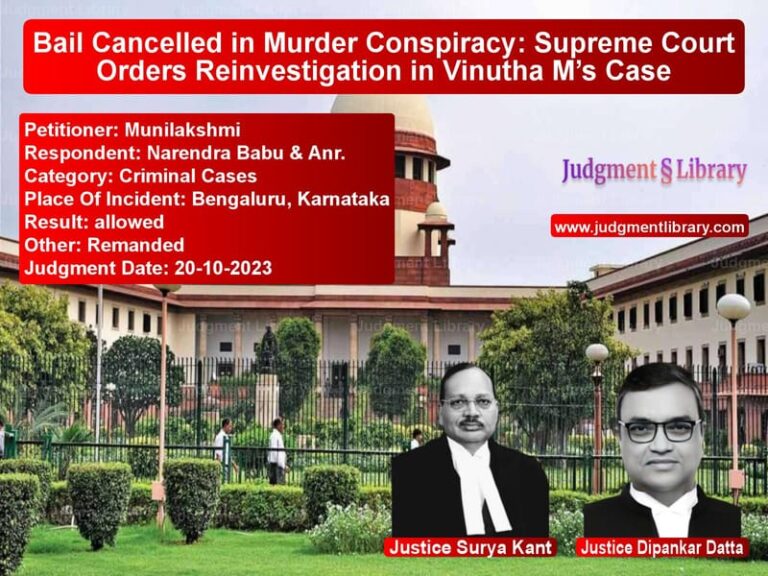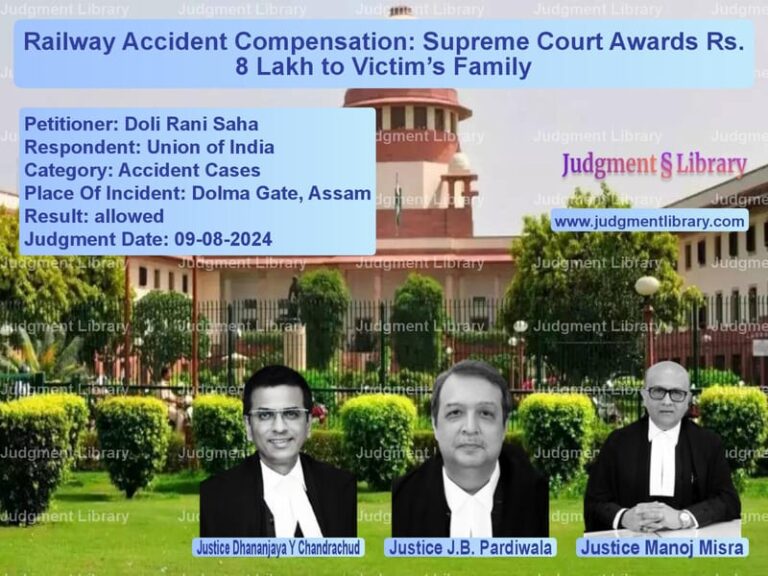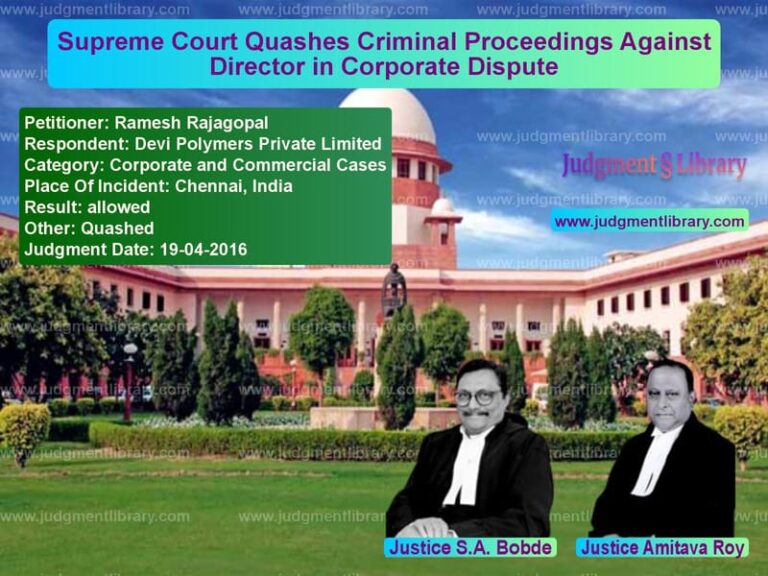Supreme Court Directs Reforms in Jagannath Temple Management: Key Rulings on Security, Transparency, and Devotee Rights
The case of Mrinalini Padhi vs. Union of India & Others is a landmark judgment concerning the administration and governance of the Shri Jagannath Temple in Puri, Odisha. The Supreme Court of India was called upon to address multiple grievances related to temple management, including the security of the temple’s Ratna Bhandar (treasury), transparency in financial matters, behavior of servitors, hygienic conditions in the temple premises, and the rights of devotees to have unhindered darshan.
The ruling is significant in ensuring the protection of temple assets, maintaining financial accountability, and improving facilities for devotees. It also reaffirms the fundamental rights of citizens to visit and worship without coercion or undue restrictions.
Background of the Case
The case originated when Mrinalini Padhi, a social activist, filed a writ petition seeking judicial intervention in the management of the Jagannath Temple. The petition highlighted serious concerns about the administration’s inefficiency and lack of transparency. The key concerns raised included:
- The alleged disappearance of the Ratna Bhandar keys and the absence of a proper inventory of temple assets.
- Unhygienic conditions in the Rosaghar (temple kitchen) and Anand Bazar (food marketplace).
- Mismanagement of temple funds and a lack of proper auditing.
- Instances of servitors misbehaving with devotees and demanding money for darshan.
- The need for improved facilities such as drinking water, sanitation, and queue management for visitors.
Arguments by the Petitioner
The petitioner, Mrinalini Padhi, presented the following arguments before the Supreme Court:
- Failure to Safeguard the Ratna Bhandar: The state authorities had failed to provide a clear explanation for the missing keys of the temple treasury. The disappearance of these keys raised concerns about mismanagement and possible misappropriation of valuable temple assets.
- Right of Devotees to Unhindered Darshan: The petitioner argued that many servitors harassed devotees and extorted money under the pretext of facilitating easier darshan.
- Hygiene and Cleanliness Issues: The petitioner pointed out that the temple premises, particularly the areas where food was prepared and distributed, were unhygienic and lacked proper sanitation facilities.
- Mismanagement of Temple Funds: The petitioner contended that there was no financial transparency regarding temple donations and expenditures.
Arguments by the Respondents
The respondents, including the Union of India and the Odisha State Government, defended the temple management practices, arguing:
- Security Measures Were in Place: The state government assured the Court that steps had been taken to secure the Ratna Bhandar and that an investigation was underway to locate the missing keys.
- Temple Fund Management: The authorities claimed that the finances of the temple were regularly audited and that any discrepancies were being addressed.
- Improvement in Hygiene Standards: The state government submitted reports detailing initiatives to improve hygiene and sanitation within the temple premises.
- Servitor Regulation: The government acknowledged that some servitors had misbehaved in the past, but disciplinary actions had been taken against those found guilty.
Supreme Court’s Judgment
The Supreme Court delivered a comprehensive ruling, directing multiple reforms to improve temple administration and ensure devotees’ rights. The key directives included:
1. Investigation into the Missing Ratna Bhandar Keys
- The Court ordered a special inquiry into the disappearance of the Ratna Bhandar keys and directed the government to submit a detailed report.
- It emphasized the importance of maintaining an updated inventory of temple valuables.
2. Devotee Rights and Regulation of Servitors
- The Court directed temple authorities to implement a zero-tolerance policy against servitors harassing devotees.
- It ordered the establishment of a grievance redressal mechanism for complaints against servitors.
3. Hygiene and Cleanliness Measures
- The Court mandated an independent sanitation audit of the temple premises.
- Authorities were directed to provide clean drinking water and improve waste management systems.
4. Transparency in Temple Fund Management
- The Court instructed the Odisha government to conduct annual financial audits and publish reports for public access.
5. Implementation of a Queue System
- A structured queue system was ordered to ensure smooth darshan for all devotees.
6. Formation of a High-Level Committee
- The Court directed the formation of a high-level committee comprising government officials, temple priests, and legal experts to oversee the implementation of its directives.
Impact of the Judgment
This ruling has significant implications for temple management across India:
- Strengthens Devotee Rights: Ensures that devotees are not harassed and can worship freely.
- Ensures Transparency in Temple Administration: Mandates financial audits and public disclosure of temple funds.
- Improves Hygiene and Infrastructure: Encourages better sanitation, drinking water facilities, and visitor management.
- Holds Authorities Accountable: Establishes a precedent for judicial intervention in temple mismanagement cases.
Conclusion
The Supreme Court’s judgment in Mrinalini Padhi vs. Union of India & Others is a landmark ruling that upholds the rights of devotees and reinforces the importance of transparency in temple administration. By directing necessary reforms in security, financial management, hygiene, and visitor experience, the ruling sets a precedent for religious institutions across India. This case highlights the judiciary’s role in ensuring that temple management adheres to principles of fairness, accountability, and public trust.
Petitioner Name: Mrinalini Padhi.Respondent Name: Union of India & Others.Judgment By: Justice Arun Mishra, Justice M.R. Shah, Justice S. Ravindra Bhat.Place Of Incident: Puri, Odisha.Judgment Date: 04-11-2019.
Don’t miss out on the full details! Download the complete judgment in PDF format below and gain valuable insights instantly!
Download Judgment: Mrinalini Padhi vs Union of India & Oth Supreme Court of India Judgment Dated 04-11-2019.pdf
Direct Downlaod Judgment: Direct downlaod this Judgment
See all petitions in Public Interest Litigation
See all petitions in Property Disputes
See all petitions in Consumer Rights
See all petitions in Fundamental Rights
See all petitions in Contract Disputes
See all petitions in Judgment by Arun Mishra
See all petitions in Judgment by Mukeshkumar Rasikbhai Shah
See all petitions in Judgment by S Ravindra Bhat
See all petitions in partially allowed
See all petitions in supreme court of India judgments November 2019
See all petitions in 2019 judgments
See all posts in Civil Cases Category
See all allowed petitions in Civil Cases Category
See all Dismissed petitions in Civil Cases Category
See all partially allowed petitions in Civil Cases Category







